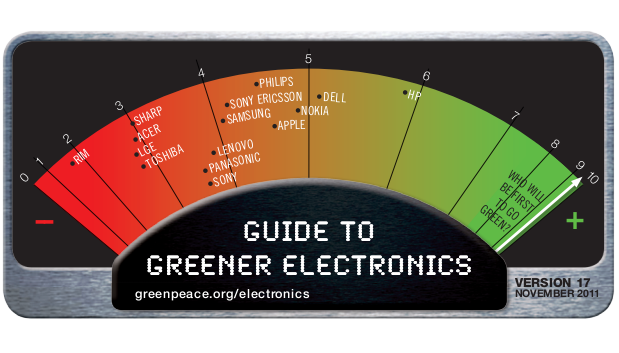HP Tops Greenpeace Green Electronics Table

HP has ended Nokia’s three year reign at the top of the Greenpeace Guide to Greener Electronics rankings
Nokia has been deposed by HP as the top ranked electronics company in the latest version of the Greenpeace Guide to Greener Electronics.
Fifteen companies were ranked according to a number of energy and climate, greener products and sustainable operations criteria and this 17th edition of the guide has been altered to reflect the priorities of Greenpeace’s campaign, with a greater focus on implementation than commitment.
Actions speak louder than words
 New criteria challenging companies to reduce their carbon footprints in manufacturing, supply chain and end-of-life phase of their products have been added as have those which encourage them to set ambitious goals for renewable energy use.
New criteria challenging companies to reduce their carbon footprints in manufacturing, supply chain and end-of-life phase of their products have been added as have those which encourage them to set ambitious goals for renewable energy use.
HP leapfrogged Nokia to the summit of the rankings with a score of 5.6 out of 10 and scored top marks for sustainable operations. Poor scores in the energy criteria contributed to Nokia’s decline and ended its three-year reign at the top of the league.
Dell’s ambitious plans to reduce emissions by 40 percent by 2020 and its strong policy on paper sourcing meant that it pushed to Nokia into third place, a massive improvement from tenth in the previous version.
The reorganisation of the rankings meant that RIM were included for the first time, but the beleaguered Blackberry manufacturer finished in last place, scoring just 1.6 points of 10, partly due to its poor disclosure of its environmental performance.
IT’s crucial role
 Greenpeace International campaigner Tom Dowdall commented, “After many of the world’s leading electronics companies rose to the challenge of phasing out the worst hazardous substances, we are now challenging them to improve their sourcing of minerals and better managing the energy use throughout the supply chain”
Greenpeace International campaigner Tom Dowdall commented, “After many of the world’s leading electronics companies rose to the challenge of phasing out the worst hazardous substances, we are now challenging them to improve their sourcing of minerals and better managing the energy use throughout the supply chain”
“Right now, HP takes the top spot because it is scoring strongly by measuring and reducing carbon emissions from its supply chain, reducing its own emissions and advocating for strong climate legislation.”, he continued, “Nokia, along with many other companies in the Guide, need to demonstrate how it will reduce future emissions through energy efficiency and renewable energy.”
Greenpeace says the guide is part of a wider campaign to convince the IT industry to reduce its global emissions and claims that it has resulted in improvements such as the phasing out of hazardous substances from electronic products.
Cisco claimed top spot in a similar table for IT companies last year, Greenpeace’s Cool IT Challenge Leaderboard, and Greenpeace has stated that the role of the IT industry in tackling climate change is crucial.
Data centre operators have been encouraged to use alternative energy sources, with Facebook attracting much of Greenpeace’s attention for its decision to power its first wholly-owned data centre in Oregon with electricity mainly generated from coal.
However Facebook recently announced it was to build a sustainable data centre in northern Sweden which would use renewable energy to power and cool its servers.